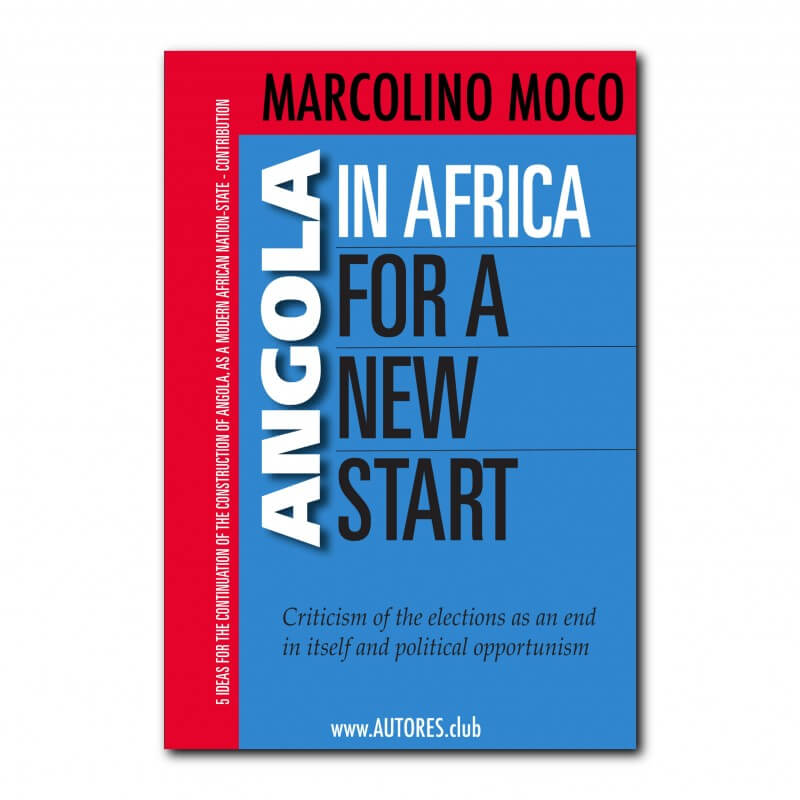













5 ideas for the continuation of the construction of Angola, as a modern African nation-state - contribution.
Criticism of the elections as an end in itself and political opportunism.
Marcolino José Carlos Moco, Doctor of Law by the University of Lisbon, was, among other public offices, Prime Minister of Angola (1992-1996) and Executive Secretary of CPLP-Community of Portuguese Language Countries (1996-2000).
Lawyer, consultant, lecturer and university professor in Angola, was a critical voice of the last years of President José Eduardo dos Santos. Recently appointed as non-executive Director of Sonangol, Angolan State oil company.
Angola: por uma nova partida (Angola: For a New Start) - (2020)
Autor: Marcolino Moco
Editora: Alende - Edições | Perfil Criativo - Edições
Edição de Angola - ISBN: 978-989-54797-0-2
Edição de Portugal - ISBN: 978-989-54702-6-6
 SEGURANÇA
SEGURANÇA
AUTORES.club utiliza medidas de segurança.
 ENTREGAS
ENTREGAS
Portugal: 4 dias; Europa: 10 dias; Resto do mundo: 20 dias.
 DEVOLUÇÕES
DEVOLUÇÕES
Pode devolver a sua encomenda no prazo de 14 dias.
(+351) 214.001.788 | encomendas@autores.club
Encomende numa loja perto de si.
Fnac | Worten | Wook | Bertrand
This English edition, with the title “Angola in Africa: for a new start”, contains some extracts translated into that language, from the complete text in Portuguese, titled ANGOLA: por uma nova partida.
ANGOLA: por uma nova partida comes in the wake of editions, in Portuguese, which have by now constituted a trilogy with Angola: a Terceira alternative (Angola: the third alternative), 2012 (without translation to English), a presentation of ideas that I thought could fix, before the 2012 Angolan Elections, the tremendous distortions introduced in the Angolan formal and informal political system by José Eduardo dos Santos, after the end of the civil war in 2002, with the death of Savimbi; Angola: nation-state or political ethnicity state?, 2015 (with relevant extracts translated to English, in the book Angola in Africa: nation-state or political-ethnicity state?, 2018), a collection of texts with an epilogue that proposes to analyse the historical, anthropological and socio-political reasons that may be in the basis of the conflict in African States and in the pernicious nature of many of their political leaders, speculating, finally, on possible reme-dies to overcome the problem as soon as possible. In the second work, Angola appears as a case study of a virtually widespread situation, particularly in sub-Saharan Africa. In the case of ANGOLA: por uma nova partida I elected the issue of multiparty elections, as they are applied uncritically, in Africa, from the Western model, describing it as one of the causes of disturbance of various African States, in which Angola appears once more as a paradigm.
Notwithstanding the cuts from the original Por-tuguese version, I think that with these extracts I can call upon English readers (scholars) to discuss my contribution with a critique of the idea, that seems mistaken. This one that multiparty elections in sub-Saharan Africa and in Angola, in particular, contain a value in itself. When we are in the search for solutions to the serious ethical, political, economic and social problems which bind the continent and each of our countries. And I end up proposing ideas that can be summarized as pacts that precede or follow the elections, which will contribute to adapt the structures of our states to the socio-political, anthropological and regional reality of the continent and of each of our countries with a very young constitution. Ideas that at the same time can contribute to our adaptation to the speed of modern times.
Thus, the items here included are:
I - Elections as a universal concept in the context of liberal democracy (West type), approaching the emergence of the idea of elections in the context of the political institutions of Western type, as they are suitable to an endogenous solution, within the framework of an historic process itself, without being, however, devoid of problems, at present;
II - Elections outside the West and Africa, in particular, to address the issue of the specificity of elections in Africa and its problems before a reality with features that are not totally taken into consideration;
III - Review about elections in Angola, and consequences, to address the election context in the country and its recurrent problems;
IV - Just a few topics that characterize, apparently and positively the action of the newly elected president, ending in a conclusion where we reiterate the necessity of covenants for the continuation of the construction of our Angolan nation-State (of our African nation-states);
V - Contribution with five ideas for the continuation of the construction of the African nation-state, in the next legislative five-year period , to review the topics on the agenda proposed earlier, in the light of past developments and lessons learned.
Finally, it is vital to clarify that the subtitle “for a new start” is a paraphrase of the title of the work by the French René Dumont, L’Afrique noire est mal parti (1962), which applied to Angola refers to the successive times in which opportunities to have a better future emerged, like this time, with the withdrawal of José Eduardo dos Santos and the arrival on the scene of a new political leadership. An excellent opportunity to mount a transitional platform that puts aside a new witch hunt and another election of scapegoats; exactly what was preventing the creation of new departures, in the past.
Também poderá gostar